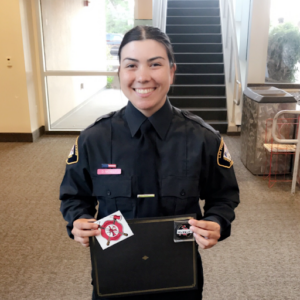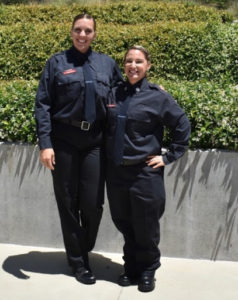
Name and age: Danielle McNely, 23
Years Attended at LPC: 3 years
Current job/title: Firefighter for Cal Fire SCU
What’s your role in the recent Lightning Siege of 2020 fires? What base or complex were you assigned to?: I was assigned to the SCU Lighting Complex. My engine company was one of the first engines on scene fighting fire in the Livermore area.
How long have you been actively involved in combating these fires?: I have been on shift for 23 days so far, but anticipate a longer road ahead due to other parts of the state having large fires.
What are your average duties like in a shift, what is it you actually do?: As a firefighter for Cal Fire there are many responsibilities. Our minimum shift is 72 hours, but we are likely to work more during fire season. Firefighters are to ensure all of their safety gear and equipment on the engine is ready to go in working order at all times. On a normal day, the engine company cooks meals together, completes a workout, daily training and station projects. We are an all hazard department, meaning we can go to any emergency at any time of the day/night. Cal Fire is also known for traveling to other units in the state to help fight wildland fires.
How did the fire program at LPC help prepare you for the fires you’ve been dealing with?: Going through the Fire Program at Las Positas, including the Fire Academy, greatly helped me prepare for my job. After the academy I felt confident in my knowledge and abilities to become a new firefighter.
Is there anything you’ve encountered so far that the school can’t prepare you for?: I believe the academy set a great foundation for me to work as a firefighter. Every emergency situation is different, making it hard to prepare cadets for every given situation. These things include active fire, working with other agencies, environment, the public, etc.

Name and age: Jessica Beristianos / 31 years old
Years Attended at LPC: 2 years
Current job/title: Firefighter Intern, Calaveras Consolidated Fire District
What’s your role in the recent Lightning Siege of 2020 fires? What base or complex were you assigned to?: I was assigned to the LNU (Lake Napa Unit) Complex. I went up to the LNU Complex as a single resource on a Type-1 engine. The crew and I were assigned to the Helitack base as part of the crash rescue team. We were staged at the helicopter base in case of an emergency with any of the helicopters. We were in constant communication with the various pilots in order to know how to best navigate through their specific aircraft. (For example, how to shut off fuel, shut off power, turn off the rotor, knock out windows, extricate them)
The fires that we were near were the Hennessey Fire and the Walbridge Fire.
How long have you been actively involved in combating these fires?: I was out at the LNU complex for 14 days. It was my first time “Out of County” which means leaving the county you currently work for (in my case it was Calaveras County) and going out to a different county to help with mutual aid. This was a great opportunity for my first time out. It was a great learning experience. I got a chance to see how everything works from base camp, radio communications, morning briefings, etc. There are many different parts that go into the whole process that I got to witness first-hand. I learned so much!
What are your average duties like in a shift, what is it you actually do?: Like I previously mentioned, there are so many roles that go into these big complexes. From those fighting on the fire line to those working with logistics/planning/operations. Everyone has a role, and each one is just as important.
My assignment this time was part of the Crash Rescue Team, where I was staged at the helicopter base. As for shifts, we worked 12 hours on and 12 hours off since the helicopters could not fly at night. Other shifts will look like 24 hours on and 24 hours off. During our 12-hour shift, we would participate in morning briefings where we would be updated on fire containment, goals for the day, weather behavior for the day and days to come, as well as different helicopters that were coming in/out for the day.
Every day we would tie in with the pilots/helicopter crew to check in for emergency procedures as well as run drills with the water tenders. A lot of our job was to stand-by and be ready.
How did the fire program at LPC help prepare you for the fires you’ve been dealing with?: The fire program at LPC did a great job of providing the knowledge and the preparation for the job. In the academy, we had two whole weeks dedicated for Wildland (which is the type of firefighting we are doing on these big fires). I was able to use a lot of the things I learned from the academy and implement them in real life situations.
Is there anything you’ve encountered so far that the school can’t prepare you for?: I believe the LPC program did all it could to prepare us for the career in the fire service. One of the biggest lessons I learned from my instructors is that there is no better way to fully prepare for the job than by getting hands-on experience. The LPC Fire Academy provided great simulations and filled us with the knowledge but applying it to real life is the ultimate way to prepare.
Taylour Sparkman is a staff writer for The Express. Follow him @T_Sparkman_330.




